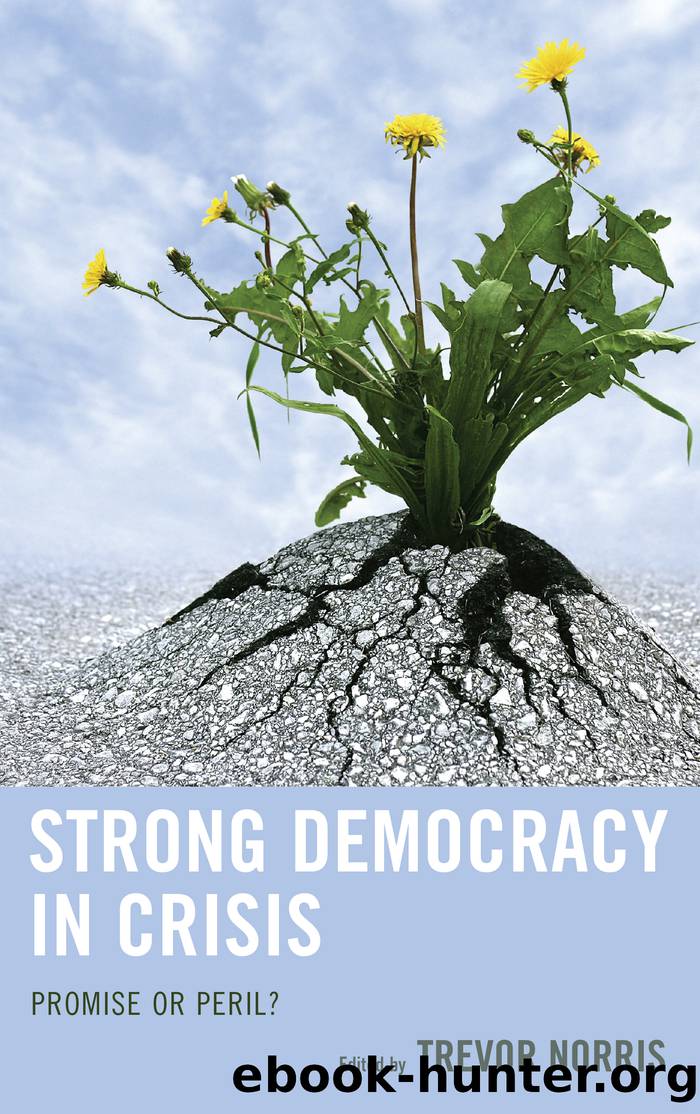Strong Democracy in Crisis by unknow

Author:unknow
Language: eng
Format: epub
Tags: undefined
Publisher: Lexington Books
Published: 2012-08-15T00:00:00+00:00
Neither Rousseau nor Barber thought a political life with the qualities of âintimacy, simplicity (rusticity), autarky, equality, and public-spiritednessâ could be easily institutionalized in the historical world in which most people lived. These qualities provided no blueprint for prescriptive implementation. Instead they described an ideal type, a conceptual fiction indicating a point of aspiration, one the Raetian experience showed to be evidently within the scope of human possibility, characterizing conditions under which the human person and public citizen could thrive in one body without alienation from one another. These criteria become grounds for criticizing diverse claims to normative authority, saying what is wrong. Further, they become standards for evaluating the relative merits of competing alternatives for action, saying what could be right. The educator that Barber saw in Rousseau was a person of many talents yearning to use them among people he recognized with sympathy (intimacy), on matters essential to all (simplicity), without effort drained into external sinks (autarky), with all sharing fully in both benefits and burdens (equality), and with betterment measured through what serves all in common (public spiritedness). We can see Barber as educatee carrying Rousseauâs commitments forward, not slavishly as disciple, but extending them, disclosing further possibilities in which the educator is often again that âinvisible presence.â
Rousseau as educator is evident throughout Barberâs work. Our purpose here is two fold. First, we need to observe the scope of the work and the interaction between Barber and Rousseau within it. In observing that interaction, our aim is neither to show that Barber is a correct or exemplary interpreter of Rousseau, nor that Rousseau is key to the success or failure of Barberâs ideas. Rather our purpose is to note the scope and character of the interaction in order to assess what Barber as educatee gains from Rousseau and discloses about him. Then, second, we can step back and reflect on the problematic of the educator in contemporary education in light of what we have learned about Rousseau as educator in Barberâs experience.
Every personâs life has an actuality that is subject to many different constructions, depending on the interest taken in it. Looking at Barberâs experience with an interest in Rousseau as educator, we can say that the basic relation between educator and educatee was set with the publication of Communal Liberty in 1974. Roughly ten years of consolidation and further gestation followed, resulting in several books reiterating Barberâs critique of liberal theories of politics and exploring ways in which more participatory principles could be given some historical reality. By the mid-1990s, Barberâs agenda coalesced into a series of commentaries on contemporary life, critiquing the significant consequences of liberalism in political and ecoÂnomic life. These reached a wide audience through publications and an influential one through consultation, but with little historical movement towards Barberâs underlying Rousseauean convictions. Currently, Barber appears to be rethinking how those convictions might possibly impinge on historical realities, advancing a more visionary sense of how a globalized urbanism might conduce to conditions of âintimacy, simplicity (rusticity), autarky, equality, and public-spiritedness.
Download
This site does not store any files on its server. We only index and link to content provided by other sites. Please contact the content providers to delete copyright contents if any and email us, we'll remove relevant links or contents immediately.
The remains of the day by Kazuo Ishiguro(8999)
Tools of Titans by Timothy Ferriss(8396)
Giovanni's Room by James Baldwin(7346)
The Black Swan by Nassim Nicholas Taleb(7129)
Inner Engineering: A Yogi's Guide to Joy by Sadhguru(6796)
The Way of Zen by Alan W. Watts(6614)
The Power of Now: A Guide to Spiritual Enlightenment by Eckhart Tolle(5782)
Asking the Right Questions: A Guide to Critical Thinking by M. Neil Browne & Stuart M. Keeley(5775)
The Six Wives Of Henry VIII (WOMEN IN HISTORY) by Fraser Antonia(5515)
Astrophysics for People in a Hurry by Neil DeGrasse Tyson(5190)
Housekeeping by Marilynne Robinson(4447)
12 Rules for Life by Jordan B. Peterson(4304)
Ikigai by Héctor García & Francesc Miralles(4274)
Double Down (Diary of a Wimpy Kid Book 11) by Jeff Kinney(4272)
The Ethical Slut by Janet W. Hardy(4253)
Skin in the Game by Nassim Nicholas Taleb(4249)
The Art of Happiness by The Dalai Lama(4130)
Skin in the Game: Hidden Asymmetries in Daily Life by Nassim Nicholas Taleb(4007)
Walking by Henry David Thoreau(3962)
